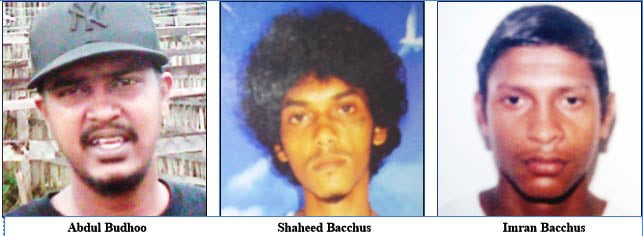While affirming the convictions of murder and manslaughter in the killing of his two cousins, the Guyana Court of Appeal yesterday reduced Abdul Budhoo’s sentence from what was a combined total of 62 years to 30 years instead.
Finding the previously-imposed sentence to have been unduly severe and contrary to guidelines established by case law precedent, the appellate court made the reductions.
Following his conviction back in 2017, trial judge Navindra Singh had sentenced Budhoo to 62 and 32 years respectively for killing brothers—Imran and Shaheed Bacchus.
He had ordered the sentences to be served concurrently.
While the jury convicted Budhoo for murdering Imran, it found him guilty on the lesser count of manslaughter for Shaheed’s death.
After noting its findings yesterday morning, however, the Court of Appeal set aside the 62-year sentence and imposed 30 years—from which it made deductions for time spent on remand awaiting trial and other mitigating factors—thereafter arriving at 25 years, seven months.
The same was done for the manslaughter sentence which was reduced from 32 to 25 years and then to 20 years, seven months after again considering several mitigating factors and time spent on remand.
Having regard to principles laid down in case law precedent, Justice of Appeal Dawn Gregory who read the ruling of the Court said the reductions were necessary, while noting that the amended sentences are also to be served concurrently.
Among other things, Budhoo had argued in his appeal that the trial judge had not given him full credit for time spent in custody prior to sentencing, while noting that this was rather done at the judge’s discretion.
The Appellant had contended also, that Justice Singh’s pronouncement that time on remand is to be deducted at his discretion, without stating more, went against established principles.
With specific reference to the manslaughter sentence which the trial judge had imposed, Budhoo argued that the judge had failed to consider among other things, the degree of the provocation, the extent and timing of the retaliation, and the circumstances of the killing.
To the murder conviction, Budhoo had argued through his attorney Mark Conway, that the direction on provocation given by the judge to the jury amounted to a material misdirection which he said may have affected the jury’s verdict.
He contended that the misdirection was to the extent that the jury may have formed a belief that a finding of provocation is impossible where the accused had an intention to kill and therefore such an erroneous belief meant that he (Budhoo) may have been robbed of the possibility of a verdict of manslaughter against Imran Bacchus.
The appellate court, however, said that it did not so find, while noting that there was no evidence to substantiate a miscarriage of justice on such grounds.
The appeal was heard by Justice Gregory, along with acting Chancellor Yonette Cummings-Edwards and Justice of Appeal Rishi Persaud. The state was represented by Prosecutor Teshana Lake.
The Bacchus brothers were killed on September 30, 2012 at Industrial Area, Mackenzie, Linden.
The prosecution’s facts were that there was an old grievance among the men regarding money, which Budhoo owed to Shaheed.
Investigators had said that on the day in question, Imran and Shaheed were standing on the road awaiting transportation to get to work when their cousin passed by on a bicycle.
According to reports, there was a verbal exchange among them, after which Budhoo went home, and returned on foot. Upon his return, Budhoo continued to verbally engage the brothers, and began throwing bricks at them, even as they pleaded with him to desist.
The prosecutor in the case had said that Shaheed, who observed something bulging in his cousin’s waist, challenged him to “put down wah yuh get on yuh waist, and leh we cuff it out.”
The prosecutor said that it was at this point that the two men got into a scuffle, during which Budhoo whipped out a knife, with which he dealt Shaheed four stab wounds.
The court had heard that Imran, who then intervened to defend his younger brother, was also stabbed by his cousin.
Shaheed died of stab wounds to the lung, compounded by shock and haemorrhage; while Imran died of a stab wound to his heart.










